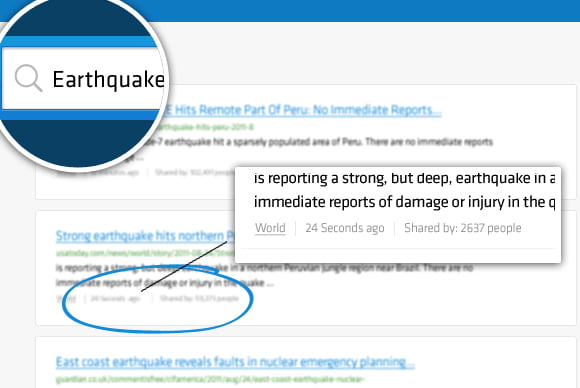An Israeli-American startup, acquired by social networking giant Twitter, claims it can finally help organize the cluster of information on social networks and turn it into relavant and useful information for users.
Julpan, a project founded by Ori Allon, had as goal to crunch social activity like status updates, tweets, Facebook likes, and RSS feeds right as they are happening to provide the most relevant content. Now exclusively on Twitter, Julpan analyzes the more than 200 million daily tweets and organizes them like a search engine.
“By looking at what links you share, what people you communicate with publicly, and what topics you often talk about, our engine is able to tell whether you’re a foodie that loves pasta, a soccer fan that loves FC Barcelona, or a passionate musician that loves The Beatles,” says Allon.
Allon started his social network search engine career a couple of years ago, after receiving his PhD from the University of South Wales, Australia, for developing a search algorithm called Orion, purchased by Google in 2006.
“The algorithm tried to track the most relevant pages for the search term, not by popular measures like the number of links a page has, but by its content,” Allon told Israeli websire Calcalist. “For example, by searching ‘4th of July’ you get results about fireworks and concerts – things that people say and mean in the context of the American independence day.”
However, in April Allon decided to leave Google and founded Julpan, a 16-man operation based in New York, which is about to launch its product in the next few months.
“Nowadays, people share so much information on social networks,” says Allon. “We do something similar to what Google has done in the search field, but in social media. For example, you can search Julpan for a restaurant, event or anything that happens today and get amazing results. The source is other users’ content, so the information available can’t be found anywhere else.”
So is it just a search engine for social networks? “It’s more like a discovery engine. The query does not have to be a word or phrase but can be your current location, what you did an hour ago, and the show you’re watching on TV or your last chat with your friends.”
“Based on the information available on [Twitter] we can know where you are and what you and your friends wrote in the last hour,” says Allon. “The beauty of this technology is that it is based on context of your location and activities. The most important thing for us is to understand the relationship between the user activity and bringing him information that is relevant for him at that moment.”
Sign up for our free weekly newsletter
SubscribeTwitter at the moment, as well as Facebook, has a very limited search engine: the user enters a textual query and the search engine shows results such as tweets and people that include words that match the query, mostly from the past few days.
Julpan on the other hand keeps a long-term database and shows results that take into account other data besides the text in the query. That way, your restaurant “check-in” can be translated into a query and Julpan will show reviews about other restaurants in the area based on check-ins made by other users that went to your current restaurant.
“When entering a question about a basketball game that was taking place between the Boston Celtics and Miami Heat, Jukpan knew I was searching for something that had to do with the game. Many people were sharing a link to the live stream of the game at that moment so Julpan decided to show me the link as a result. You can’t get a result like that anywhere else. Facebook and Twitter would have given you results like chats about the game or other irrelevant information.”
Allon gives another example: “A few weeks ago, Katy Perry signed albums a few blocks from our office. We knew that because many people that normally don’t mention her started mentioning her, her locations and what she’s doing now. That immediate information cannot be retrieved by any other service. It’s a great way for tourists and locals to find out about interesting things that happen right know in their area.”
Allon explains why no one has created a similar search tool based on information in social networks before: “The information is out there but no one yet took it and tried to make it useful. Facebook and Twitter have the information but not the means. Google has the analytics abilities but not the information,” says Allon.
About Google+, Allon says that “if Google had Facebook’s information we would have seen amazing things. That’s the main reason they launched Google+.”
Photo by vantan
Related posts

Editors’ & Readers’ Choice: 10 Favorite NoCamels Articles

Forward Facing: What Does The Future Hold For Israeli High-Tech?

Impact Innovation: Israeli Startups That Could Shape Our Future




Facebook comments